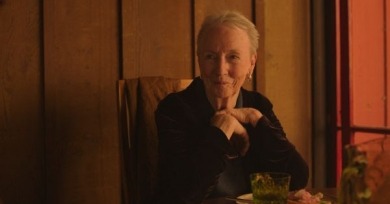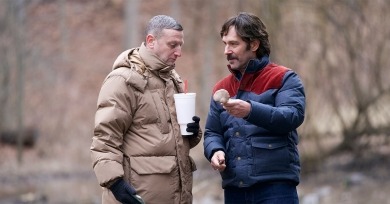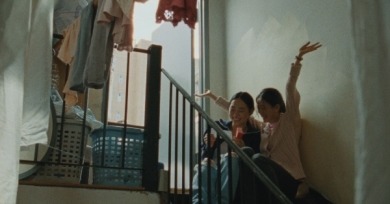Reviews
Cohen suggests that modern cinema, unshackled from genre, is more powerful than we may give it credit for. His work is porous, holding room for all these possibilities and more.
Don’t Let’s Go to the Dogs Tonight is a passion project of the best kind, and not just because it features a part actors would give their right arm to play.
In case you did not see the other two films, 28 Years Later provides a quick refresher. Serving as audience surrogates, a living-room gathering of increasingly anxious children watch Teletubbies while all hell breaks loose outside. Only one of them makes it out alive.
Uninterested in proffering any moral judgments on bullfighting as a tradition, Serra instead investigates the perceptual, bodily specifics through which such a practice is both produced and sustained.
Familiar Touch, the debut narrative feature from Sarah Friedland about an octogenarian woman entering a full-time memory care facility, exists along the edges of the coming-of-age film. Ruth (Kathleen Chalfant), a chic Southern Californian, must manage new and pre-existing relationships within her changing circumstances and state-of-mind.
Jonathan Millet has crafted a humanist spy thriller set amid the lingering memories of the Syrian civil war and the atrocities perpetrated by Bashar al-Assad’s regime that is both satisfyingly tense and gently hopeful.
Rather than see the film as a tentative foray into fiction, it may be more useful to consider The Damned as a film that explores how one might have gone about making a documentary during the Civil War.
Yamanaka has made two features to date, along with a few shorts and some contributions to television programs, yet her body of work already contains enough formal gambits and tonal shifts that one might expect from a significantly more experienced filmmaker.
As Craig platonically courts his cool TV weatherman neighbor Austin with increasing sweaty neediness, you wait for the other shoe to drop and for the proceedings to turn ugly.
As the financial health of the film industry deteriorates, it will necessitate smaller crews, fewer shooting days, and various other constraints . . . Caught by the Tides represents a different kind of film that can emerge from unorthodox methods and stands as a testament to the medium’s long-term possibilities.
The often solitary experience of analog filmmaking, as exemplified by the landscape films of James Benning, Babette Mangolte, and Peter Hutton, necessitates a free-form style that takes into account the scope and contingencies of nature itself.
Blue Sun Palace represents a new aesthetic vernacular for stories of the New York City working class, betraying international inspiration more than Sundance-school neorealism.
In Emergent City, a documentary by Kelly Anderson and Jay Arthur Sterrenberg about the Brooklyn Sunset Park district, community comprises more than a group of people who live within designated boundaries; it is a living, breathing body.
Carrying on with the tradition of mingling eros with the abject, The Shrouds reimagines how we might visually regard our faithful departed.













